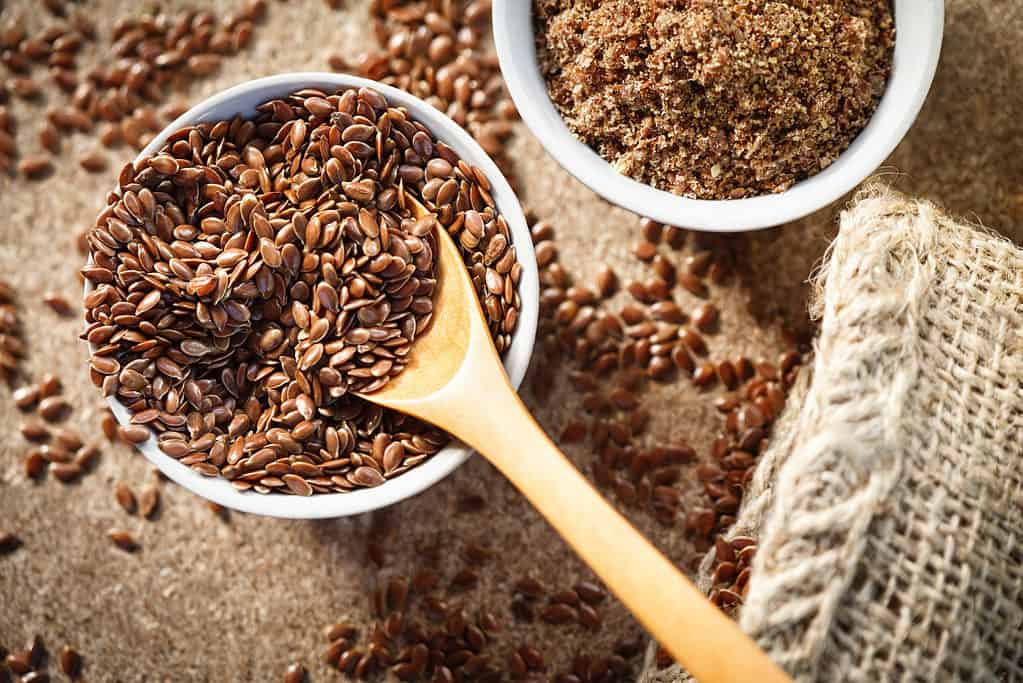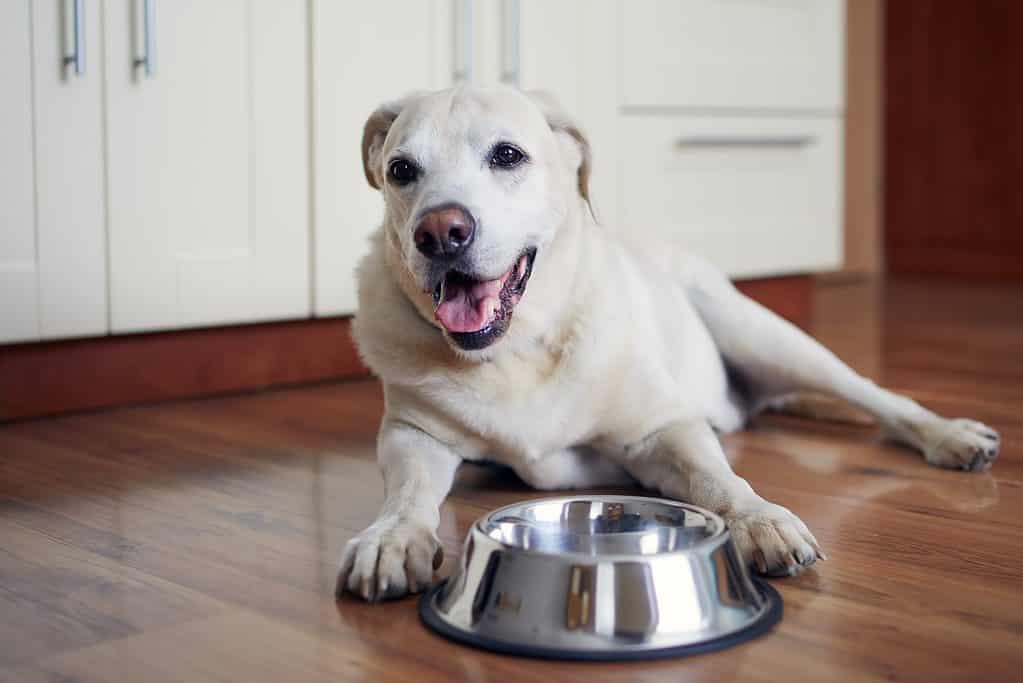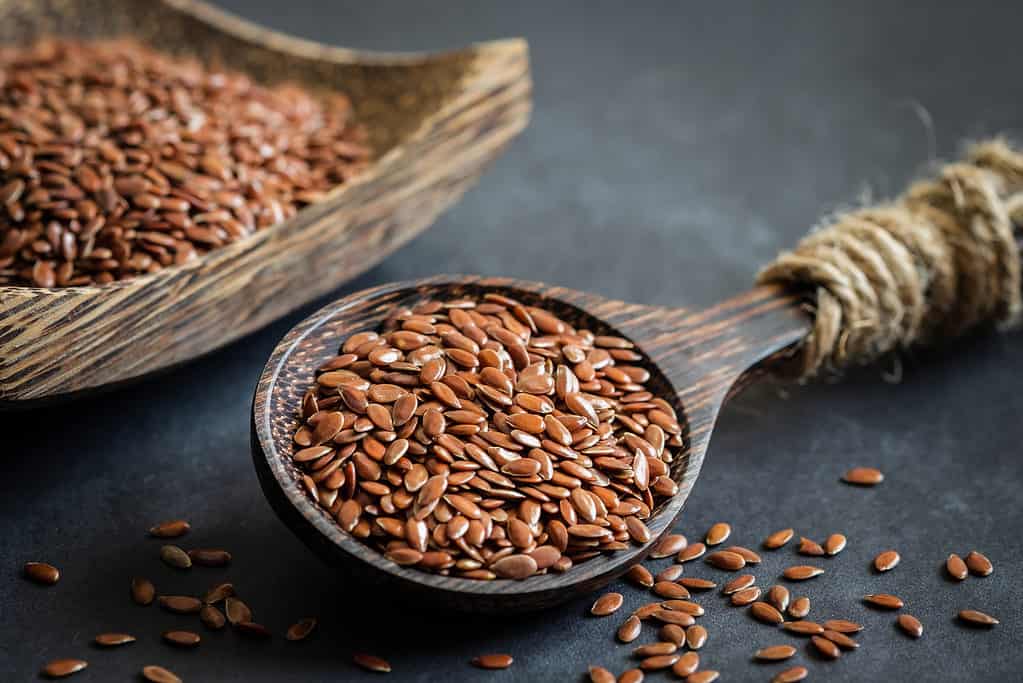Not all human foods can be shared with our dogs, as much as we might want to! That’s why we get so excited when we find healthy human foods that dogs can also eat.
This article will discuss whether dogs can eat flaxseeds, the risks, and how to feed flaxseed to your dog safely.
Is Flaxseed Safe for Dogs?

Flaxseed is safe for dogs, with a few exceptions.
©iStock.com/panco971
Flaxseed is safe for dogs, with a few exceptions. Firstly, the whole seed can be difficult to digest and poses a choking hazard, especially for small dogs.
It also contains a very small amount of cyanide – which, of course, can poison dogs in large enough amounts. This means that your dog can get sick if it eats too much flaxseed, so it’s important to store it out of its reach.
If the seeds aren’t soaked, they contain phytic acid. This is an antioxidant that makes it more difficult for your dog’s body to absorb nutrients. Soaking the seeds helps remove phytic acid, making the seeds healthier to eat.
Lastly, make sure the flaxseed is still good, or it can make your dog ill. The best way to store both whole and ground flaxseed is to refrigerate them.
Flaxseed is best fed in either powder or oil form. You can buy either from the store or make flaxseed powder yourself.
Now that we know flaxseed is safe, let’s dive deeper and discuss its benefits and a few risks to watch out for.
Benefits of Flaxseed for Dogs
- Omega-3 and omega-6 reduce inflammation, which can help dogs with arthritis feel less pain. This makes flaxseed a good supplement for senior dogs or large breeds in particular.
- Antioxidants support a healthy immune system and also promote good coat and skin health. This can help dogs with itchy skin, dandruff, or allergies.
- Fiber helps your dog’s digestive system run smoothly. If your dog is prone to an upset stomach, flaxseed may help.
Risks of Flaxseed for Dogs
- If your dog eats a large amount of flaxseed, it risks suffering from cyanide poisoning. Only feed flaxseed in very small amounts. A couple of tablespoons for large dogs, and even less for smaller pups, is enough.
If you notice symptoms like diarrhea, increased heart rate, or high blood pressure (dilated pupils, weakness, disorientation, abnormal or bloody urine, nose bleeds), see a veterinarian right away.
- Whole flaxseeds can pose a choking hazard and be difficult to digest, especially if they aren’t soaked overnight.
- When they haven’t been soaked overnight, flaxseeds contain phytic acid. This can make it more difficult for your dog to absorb the nutrients it needs from both the flaxseed and other foods.
- Too much fiber from flaxseed can cause constipation.
- Spoiled flaxseed can make your dog ill, so be sure to check the expiration date!
- Any new food can cause stomach upset, which is why it’s important to start with a very small amount and monitor your dog for symptoms like diarrhea, vomiting, or abdominal pain or discomfort.
- Flaxseed may be unsafe if your dog takes blood thinners, since it also has anti-clotting properties.
Can Dogs Be Allergic To Flaxseed?

Dogs can be allergic to flaxseed.
©Jaromir Chalabala/Shutterstock.com
Dogs can be allergic to flaxseed. If your dog is allergic, do not give it flaxseed. Allergic reactions can range from mild (itchiness) to severe (anaphylactic shock).
If your dog shows symptoms like breaking out in hives, swelling in the face, difficulty in breathing, blue gums or tongue, excessive drooling, vomiting, or diarrhea after eating flaxseed, see an emergency veterinarian right away. These are symptoms of anaphylactic shock, which may be deadly if left untreated.
How To Give Flaxseed to Dogs
The best way to give your dog flaxseed is to make or purchase flaxseed powder.
Making it yourself will save money and is good for those who like to stock supplies in bulk. Whole flaxseeds don’t need to be refrigerated and have a longer shelf-life, so you can buy them and grind them into powder as-needed.
Here’s how:
- Soak the seeds in water overnight.
- Drain the water from the seeds.
- Grind the seeds into powder using a coffee grinder, blender, or food processor.
- Store in a glass jar in the fridge to maximize shelf-life.
Remember to make small amounts of flaxseed powder at a time since you should only be feeding your dog very small amounts, and it doesn’t stay good for very long!
Can Dogs Have Flaxseed Oil?
Dogs can have flaxseed oil, yes! However, it’s important to know that the oil contains fewer nutritional benefits than the powder.
You won’t find the same amounts of fiber and vitamin B1, amongst others. But you’ll still get omega 3 and 6 if those fatty acids are what you’re looking for.
Consider what benefits you want to give your dog by feeding it flaxseed, and make your decision from there.
Does Dog Food Contain Flaxseed?
Some dog foods do contain flaxseed. We recommend looking at the ingredients in your dog’s food before feeding it flaxseed since you might be giving it something it’s already getting enough of!
Can I Give My Dog Flaxseed Every Day?

It is safe to give your dog small amounts of flaxseed daily.
©iStock.com/Amarita
It is safe to give your dog small amounts of flaxseed daily. Most people do so by adding it to their dog’s kibble.
However, you should always talk to your veterinarian before changing your dog’s daily diet. The veterinarian can advise you on whether daily flaxseed is healthy for your dog and whether it’ll help your dog in the ways you’re looking for.
If your dog has an ongoing health issue or symptoms like unhealthy skin and coat, itching, diarrhea, or joint pain, please note that flaxseed cannot replace veterinary care and medication.
While flaxseed can ease symptoms in some dogs, it’s important that your veterinarian check your dog out, diagnose it if needed, and provide treatment that gets to the root of the problem.
It can be tempting to try home remedies instead of seeing a vet, but this can ultimately worsen your dog’s health.
Up Next:
The photo featured at the top of this post is © Africa Studio/Shutterstock.com
Ready to discover the top 10 cutest dog breeds in the entire world?
How about the fastest dogs, the largest dogs and those that are -- quite frankly -- just the kindest dogs on the planet? Each day, AZ Animals sends out lists just like this to our thousands of email subscribers. And the best part? It's FREE. Join today by entering your email below.
Thank you for reading! Have some feedback for us? Contact the AZ Animals editorial team.






